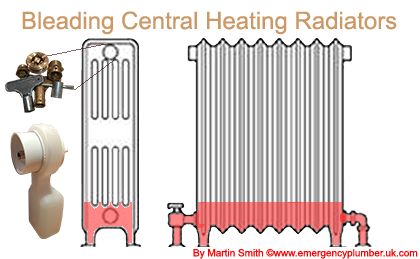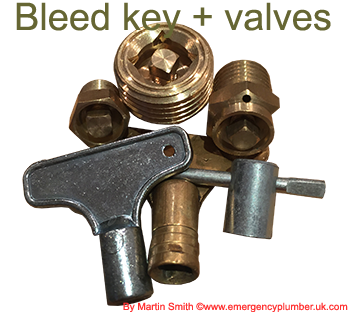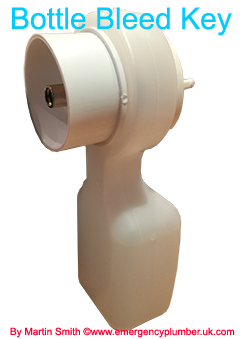Why do I have to bleed My Radiator? – Bleeding Central Heating Radiators explained

Bleeding central heating radiators by Martin Smith an emergency plumber and also a qualified gas engineer explains everything you need to know about why do I have to bleed my central heating radiator. In the last 100 years has been in massive production and has re-shaped the way we use central heating today. The central heating radiator was invented by Franz San Galli in 1855 – 1857 which included the bleeding nut and was meant for the industry to grow the UK economy. It was only in the early to mid 1900’s when the change came and that it was to be revolutionallised so that we can all gain from having bleeding central heating radiators in our home. With every radiator there comes the bleeding process in order to have our central heating radiators full of water.
Bleeding radiators on central heating systems questions and answers
Here are the top 14 questions asked by the public when it comes to bleeding central heating radiators. These may not be in order.
- Why do we have to bleed our radiators?
- Why do radiators have to have a bleed key in order to let water into the radiator?
- Why do we get air in our radiators?
- Why do I have to bleed my radiator every so often?
- Is there any way to prevent the bleed nipple from going missing when bleeding the radiator?
- Why is my radiator corroding at the bleed valve, is there a way to prevent this?
- What is the best type of bleed valve that we can have on a radiator?
- How can I loosen a bleed valve that is stuck?
- My bleed nipple has broken, do I have to buy a new radiator or is there a way to solve this problem?
- Can I bleed the radiator when the central heating is on?
- Is it better to fill up the central heating system at mains water pressure or at gravity fed water?
- What is the best radiator with the best bleed valve?
- Could you say the best type of bleed key is the bottle bleed key?
- What is the other name for a bleed valve?
Why do we have to bleed our central heating radiators
The reason we have to bleed our radiator is because air gets into the central heating system. The air can get into the central heating through a few different methods.
Why do radiators have to have a bleed key in order to let water into the radiator
The old fashioned way for when bleeding a radiator was first invented is that there would be a fitting at the size between 10 to 15mm that you would take out in order for the water pressure to push there air out until full and then very quickly the hole would then be covered up by the fitting. As technology got better then the valve was easy to use and the was no more need for the pair of grips and the bleed key could then be used.
Why do we get air in our central heating radiators
One of the main reasons why we get air into the radiator from the central heating system is that the water carries air pocket around the central heating and mostly from open tanks on a vented central heating system. Today we don’t get as much air as we use to due to the central heating system being unvented, however there is still air pockets trapped into the water.
Why do I have to bleed my central heating radiator every so often
The reason why you need to bleed your radiator every so often is most likely because you have an open central heating system where the radiator are filled up by using the gravity water pressure and the tanks are open vented. Other reason could be corroding pipe where slowly leaking radiator come into contact with the outside air. If you have a badly designed central heating system then the central heating pump may also pull in air to a radiator.
Is there any way to prevent the bleed nipple from going missing when bleeding the radiator
This is quite a common plumbing situation where the bleed valve goes missing and an emergency plumber is then called out. The only way you have is to either just undo the bleed valve a couple of turns and be patient for the bleeding process to take place or to place a litter jug and a big plastic sheet cut to shape under the radiator valve. Some people may think that putting a big plastic sheet of plastic under the radiator is a bit extreme however the extreme part starts when the bleed nipple misses the jug for some bizarre reason and lands directly below.
Why is my radiator corroding at the bleed valve, is there a way to prevent this
The reason why you have your radiator corroding at the bleed valve is because the mix of air, water and metal has a reaction. If the bleed nipple is not tightened up correctly and you have a very slow weep that is not seen, then the process of corrosion takes place, corrosion can also start from the inside out where the radiator has air inside but also mixes with water and metal. Unfortunately once the corrosion starts, it then spreads and absorbs the any damp air and spreads until there is no strength in water holds the central heating water in and leaks water resulting in you needing an emergency plumber.
What is the best type of bleed valve that we can have on a radiator
The best type of radiator bleed valve we can have would be a radiator valve that self bleeds, however due to the cost of these type of valves is the reason we don’t have them. Another issue is because there is not enough feed back on self bleeding radiator valves from problems occurring. As up to now we can say it should be ok if you were to have them around your home but with no guarantee with to what happens if they were to ever go faulty.
How can I loosen a bleed valve that is stuck

If you would like to loosen a bleed valve that is stuck then the best time to do this is when the radiator is at it’s hottest or you may want to place some liquid that fights against corrosion. Depending on how bad the valve is stuck in place, you should then with a tightly fitting bleed key undo the bleed nipple in an anti-clockwise movement and undo the bleed nipple.
My bleed nipple has broken, do I have to buy a new radiator or is there a way to solve this problem
From time to time, the bleed nipple breaks away either due to over tightening or the bleed nipple being stuck. If the bleed nipple is inserted into a bleed valve then the bleed valve should be replaced, however if the bleed nipple is directly into the radiator, the only method would be to either cut a slot for a flat head screw driver or to use a drill and a special tool for taking out bleed nipple. Tip: You may be able to find similar tools in Halfords that mechanics use.
Can I bleed the radiator when the central heating is on
I would have to be very careful in what I say here because when you bleed the central heating system, you can very easily scald yourself as some plumbing engineers could tell you. Bleeding a central heating system when the heating is on is only for the best of central heating engineers that fully know what they are doing and are very skilled in what they do. It is also important to bleed the central heating system when it is cold and the pump is not running to make sure there is no airlock in the central heating system and the radiator fill up as balanced.
Is it better to fill up the central heating system at mains water pressure or at gravity fed water?
By filling up the central heating system with mains water pressure you are most likely going to make the process allot quicker and you are more likely going to push out any airlocks apart from some very stubborn once that may be about. On a gravity feed system, there should always be a free flow with no stubborn areas or any partial central heating water airlocks as this could find either vary difficult or almost impossible to bleed the central heating system. In most central heating system where the water is sludgy you will find it almost impossible to bleed the central heating system and would be in need of a power flushing.
What is the best radiator with the best bleed valve?
The best type of radiator with the best bleed valve would be the Stelrad. The stalrad has easy to use bleed nipple with either a flat head screw driver or a bleed key but also if the bleed nipple ever fails, the bleed valve can be replaced.
Could you say the best type of bleed key is the bottle bleed key?

If you are one of those who worries about getting water over the floor then there are a few options you can take, first Martin would place an old towel over the floor for precaution, secondly you could use the bottle bleed key that lets you know how much water has come out of the radiator before you decide to tighten up the bleed valve.
Another name for the bleed valve is the bleed nipple but due to laws we are no longer aloud to call it this as some people may find this too sensitive.
If your a customer that would like to use a professional plumbing and heating engineer and feel that you have plenty of knowledge when it comes to bleeding central heating radiators then please feel free to give us a call as we are a national plumbing emergency service working 24 hours a day, 7 days a week. If your a plumber or gas engineer looking to join us then please visit our plumbing register.

